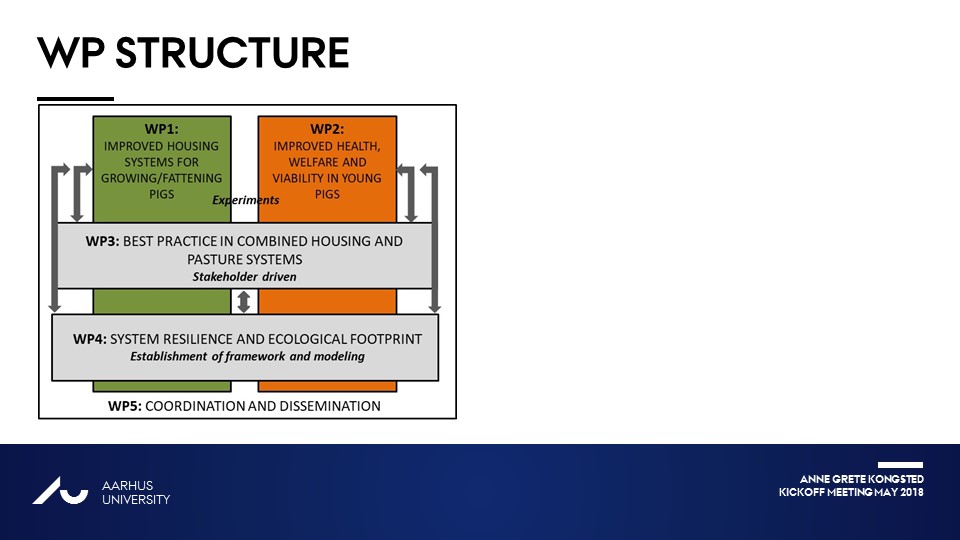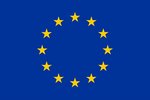Work packages
WP1: Improved concrete outdoor runs in housing systems for growing-finishing pigs
Partners: BOKU AU-AGRO, CREA-ZA, FiBL, WUR, UHF, RISE
The aim of WP1 are to investigate the effect of selected innovative designs of concrete outdoor runs in organic housing systems on animal welfare and pen hygiene, to reduce the risk of ammonia losses and impaired behavioural needs.
WP1 includes three tasks:
Task 1: Identification of innovative strategies for controlling the pigs’ excretory behaviour and location will be selected. The strategies should promote the pigs’ ability to perform species-specific behaviour like rooting, resting and thermoregulation. The selection will be based on a review of existing scientific knowledge combined with practical knowledge obtained through input from stakeholders (via interviews or workshops facilitated by WP3).
Task 2: Experimental evaluation of identified innovations in 5 partner countries will be carried out to investigate the effect of the 2-4 selected innovations on pig welfare (e.g. behaviour and animal based parameters) and environmental impact (e.g. pen hygiene). These innovations include e.g. the degree of roofing, floor design, rooting areas, walls to structure the area, showers, air cleaner below floor level. Outdoor runs for growing-finishing pigs will be investigated under various climatic conditions caused by geography as well as seasonal variations. Each innovation will be tested in at least two different countries, and at least two different seasons (winter/summer), and compared with control pens on the same farm.
Task 3: Case-studies on ammonia losses on 1-2 farms will examine the effect of a hygiene improvement measure on ammonia losses from concrete outdoor runs, using an equilibrium concentration method.
Expected results:
1. Identification, development and evaluation of innovations ensuring the behavioural needs of pigs (excretion, exploration and thermoregulation) and reduction of ammonia emissions in organic systems with concrete outdoor runs, to be communicated through a scientific paper, conference presentation and fact sheets for farmers
2. Collection of data for use in WP4 (e.g. housing design, manure management, feed management systems, feed efficiency, pen hygiene, work load)
3. Practical recommendations for use in WP5 for dissemination to farmers through guidelines and workshops
WP 2: Improved health, welfare and viability in young pigs
Partners: INRA, AU-AGRO, CREA-ZA, TI-OL, WUR
The aims of WP2 are to:
(1) promote maternal behaviour and reduce piglet mortality around birth and during lactation,
(2) improve growth and health of piglets during lactation and after weaning with emphasis on gut health.
WP2 includes 3 tasks :
Task 1: investigate the effect of management, creep area and farrowing pen design on maternal and piglet behaviour and consequences on piglet survival and growth. We will collect data in commercial farms regarding the design of the creep area and production data and will perform two experimental trials. In one trial, the effects of different characteristics of the creep area (light, heating with lamps or mats) will be evaluated on piglet behaviour, performance and health as well as on economic costs. In the second trial, large (about 3 times the legal requirement) and standard farrowing pens will be compared to investigate the effects on maternal behaviour, piglet survival and piglet resilience.
Task 2: select sows with high potential for piglet survival. For that purpose, we will populate a new organic herd from INRA experimental facilities with females originating from the conventional production and bred with sires having a high breeding value for piglet survival as evaluated in the French genetic scheme under conventional conditions. The progeny will be evaluated for litter size, piglet survival and growth under organic farming conditions.
Task 3: investigate the effect of different types of management practices on piglet growth and health during lactation and after weaning. We will focus on (a) the iron supply to piglets with measures in commercial farms and under experimental conditions, (b) the effect on piglets’ hut health of fermented liquids rich in wood litter microorganisms having probiotic properties and distributed to pregnant sows and piglets during the suckling and post-weaning phase, (c) the effect of extended lactation on piglet performance and health as well as on sow reproduction.
Expected results are practical solutions for farmers, based on new scientific knowledge, to improve piglet survival and health and the overall herd efficiency.
WP 3: Best practice in combined housing and pasture systems
Partners: UHF, BOKU, AU-AGRO, CREA-ZA, FiBL, INRA, TI-OL, WUR, RISE
The aim of WP3 is to identify and evaluate best practic e examples in different combinations of housing and outdoor systems as regards animal health and welfare, productivity, feed efficiency and manure/pasture management.
e examples in different combinations of housing and outdoor systems as regards animal health and welfare, productivity, feed efficiency and manure/pasture management.
WP3 include three tasks:
Task 1: Stakeholder-driven identification of existing best practices, key challenges and innovations. Input from stakeholders will be collected by interviews or workshops based on a common protocol in all partner countries. The stakeholders will include farmer associations, individual farmers and/or key farm advisors. This will provide a systematic overview of characteristics e.g. age groups, season, pasture/manure management, and provision of food and water of combined systems across Europe. Based on this information, criteria will be defined to identify best practice examples, key challenges and possible innovations in combined housing and pasture systems.
Task 2: Evaluation of existing best practice examples. Based on identified best practice examples (Task 1) and with a common protocol, farm data from 2-5 farms per country in 6 countries (AT, CH, DE, DK, I, SE) will be collected. The observers involved in data collection will participate in training sessions and reliability testing to ensure data quality. The focus will be on the use of feed, animal health and welfare, production results, work load, pasture/manure management, etc. This will identify the specifics of optimal animal health and welfare combined with low environmental impact in best practice systems, and will provide data to WP4 for comparison with baseline values.
Task 3: Evaluation of innovations. On-farm case studies of selected stakeholder driven innovations related to combined housing and pasture systems will be carried out. Specifically, aspects of e.g. animal welfare, environmental impact (feed efficiency, soil fertility, grass cover) and quality of pork will be investigated. Examples of possible innovations to be evaluated are: time limited access to pasture; weaning of piglets outdoor vs indoor; growing-finishing pigs on pasture throughout the year in Mediterranean climate. The innovative practices will be evaluated on one or more farms, and the outcomes compared to standard organic pig industry data or to on-farm controls (depending on the nature of the innovation). This will provide data for WP4.
Expected results:
1) Upgrading of baseline farm data collected in previous national and transnational projects (e.g. ProPIG), and listing of characteristics of combined systems and soil fertility, grass cover and feed efficiency (as affected by the evaluated best practice examples and innovations) for use in WP4.
2) Transnational characterisation of combined housing and pasture systems and identification of best practice examples in cooperation with WP1-5. This will be communicated in reports and fact sheets on how to combine housing systems with outdoor/pasture in innovative and efficient ways.
WP 4: System resilience and ecological footprint
Lead: RISE, FiBL, BOKU, AU-AGRO, CREA-ZA, INRA, TI-OL, UHF, WUR
The aim is to assess the overall effect of implementing the identified innovative solutions (WPs 1-3) on system resilience and environmental footprints of combined housing- and pasture systems across Europe.
WP5 includes three tasks:
Task 1: Development of a framework for assessing system resilience in organic pig production. A framework will be developed to assess system resilience in organic pig production concerning management strategies and housing system designs. Criteria for assessing resilience will be identified and developed into measurable indicators that allow for an assessment of system resilience. A first set of resilience criteria, suitable indicators and parameters will be compiled based on a literature review and discussed and agreed through stakeholder activities of WP3. This draft assessment framework will be updated and revised as data becomes available including the results from Task 2 and 3.
Task 2: Selection of innovations for further assessment. A range of innovative strategies that improve animal welfare, health, and productivity (whilst reducing environmental impacts) will be selected and assessed for their cost-effectiveness and feasibility. The selection will be based on a literature review and the scientific and practical knowledge obtained in WPs 1-3, in cooperation with all project partners.
Task 3: Environmental and economic assessment of the selected innovations. The potential effects of manure and pasture management on N and P losses, and the overall environmental impact and cost effectiveness of the selected innovations (WPs 1-3) will be modelled. An integrated environmental and economic assessment of the selected innovations will be undertaken with a farm model developed upon existing work. The environmental impact assessment will be based on Life Cycle Assessment including all on-farm processes and up- and downstream processes connected to pig production on the farm. Impact categories assessed will cover global warming potential, eutrophication, acidification, ozone formation and non-renewable energy, water, and land use. The economic assessment will be based on a costs of production methodology to include farm input and labour costs related to pig production as well as determining the productivity and revenues from the pig production.
Expected results:
1) An assessment framework for system resilience in organic pig production concerning management strategies and housing system design
2) Assessments of novel housing and management strategies including a quantification of risks, environmental impacts and cost effectiveness. The combined environmental and economic assessment on farm level will illustrate the synergies and trade-offs between environmental improvements due to the implementation of different strategies and their impacts on farm profitability.
The outcomes will be communicated as reports and fact sheets for organic pig producers presented at scientific conferences and in peer-reviewed papers.
WP 5: Coordination and Dissemination
Partners: AU-AGRO, FiBL, BOKU, CREA-ZA, INRA, TI-OL, UHF, WUR, RISE
The aims of WP5 are to:
1) Coordinate and manage the consortium. This includes organising the meetings, assuring timely information exchange between WP partners and progress reporting;
2) Communicate the project’s findings, to support organic pig producers’ decision making and serve as a resource base for policy makers, consumers and other stakeholders across Europe.
WP 5 includes five tasks:
Task 1) Coordination and management
An Intranet web site will be established for internal communication among partners. Three 1-2 day meetings with participation of all partners will be organised with rotating meeting location. Project progress will be evaluated by WP-leaders during quarterly on-line meetings. The coordinator will assure timely reporting to Core Organic during participation in three seminars and through mid- and final progress reports.
Task 2) Dissemination plan, project website and Facebook account
Establishment of a dissemination plan to ensure extensive dissemination of the project findings at national and trans-national level. A project website and Facebook account will be created.
Task 3) Manuals for organic pig producers
The various fact sheets and other publications will be developed into manuals for organic pig producers in national languages, with focus on efficient production and reduced ecological footprint, based on results from WP1-4. This is a follow up of the ProPIG health management handbook.
Task 4) Workshops to exchange practical and scientific knowledge
Facilitation of workshops in each partner country at the end of the project. The workshops will demonstrate, communicate and exchange practical and scientific knowledge between project partners, organic pig producers and consultants. A workshop protocol and a tutorial video regarding on-farm best practice will be developed to support a systematic compilation and transnational reporting of the practical knowledge collected
Task 5) Overarching policy supporting document
An overarching policy support report synthesising the successful novel strategies generated and evaluated in WPs 1-4 will be produced. The main report will be in English.
Expected results:
1) Timely achievement of milestones and deliverables
2) Extensive dissemination of the project’s findings at national and European level

